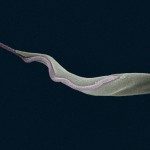Link to Pubmed [PMID] – 25890302
Parasit Vectors 2015;8:222
BACKGROUND: Proline racemase (PRAC) enzymes of Trypanosoma cruzi (TcPRAC), the agent of Chagas disease, and Trypanosoma vivax (TvPRAC), the agent of livestock trypanosomosis, have been implicated in the B-cells polyclonal activation contributing to immunosuppression and the evasion of host defences. The similarity to prokaryotic PRAC and the absence in Trypanosoma brucei and Trypanosoma congolense have raised many questions about the origin, evolution, and functions of trypanosome PRAC (TryPRAC) enzymes.
FINDINGS: We identified TryPRAC homologs as single copy genes per haploid genome in 12 of 15 Trypanosoma species, including T. cruzi and T. cruzi marinkellei, T. dionisii, T. erneyi, T. rangeli, T. conorhini and T. lewisi, all parasites of mammals. Polymorphisms in TcPRAC genes matched T. cruzi genotypes: TcI-TcIV and Tcbat have unique genes, while the hybrids TcV and TcVI contain TcPRACA and TcPRACB from parental TcII and TcIII, respectively. PRAC homologs were identified in trypanosomes from anurans, snakes, crocodiles, lizards, and birds. Most trypanosomes have intact PRAC genes. T. rangeli possesses only pseudogenes, maybe in the process of being lost. T. brucei, T. congolense and their allied species, except the more distantly related T. vivax, have completely lost PRAC genes.
CONCLUSIONS: The genealogy of TryPRAC homologs supports an evolutionary history congruent with the Trypanosoma phylogeny. This finding, together with the synteny of PRAC loci, the relationships with prokaryotic PRAC inferred by taxon-rich phylogenetic analysis, and the absence in trypanosomatids of any other genera or in bodonids or euglenids suggest that a common ancestor of Trypanosoma gained PRAC gene by a single and ancient horizontal gene transfer (HGT) from a Firmicutes bacterium more closely related to Gemella and other species of Bacilli than to Clostridium as previously suggested. Our broad phylogenetic study allowed investigation of TryPRAC evolution over long and short timescales. TryPRAC genes diverged to become species-specific and genotype-specific for T. cruzi and T. rangeli, with resulting genealogies congruent with those obtained using vertically inherited genes. The inventory of TryPRAC genes described here is the first step toward the understanding of the roles of PRAC enzymes in trypanosomes differing in life cycles, virulence, and infection and immune evasion strategies.
